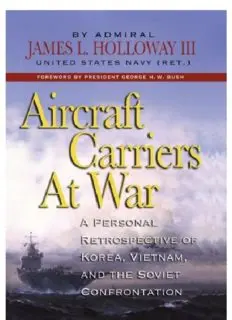
Aircraft Carriers at War: A Personal Retrospective of Korea, Vietnam, and the Soviet Confrontation PDF
Preview Aircraft Carriers at War: A Personal Retrospective of Korea, Vietnam, and the Soviet Confrontation
Table of Contents Title Page Dedication Foreword Preface Acknowledgements Chapter 1 - The End of an Era THE BATTLE OFF SAMAR THE AIRCRAFT CARRIER EMERGES THE FAST CARRIER TASK FORCE ESCORT CARRIERS TRANSITION TO NAVAL AVIATION Chapter 2 - The Cold War THE THREAT OF THE USSR THE STRATEGIC NUCLEAR BALANCE THE TRIAD NUCLEAR SAFEGUARDS THE NAVAL BALANCE SEALIFT AIRLIFT THE ROLE OF AIR POWER IN THE COLD WAR WORLDWIDE CHALLENGES TO A FORWARD STRATEGY THE STRATEGIC IMPLICATIONS OF LIMITED WARS THE ANNUAL POSTURE STATEMENT THE COLD WAR STRATEGY Chapter 3 - Korea BECOMING A JET PILOT UNPREPARED WAR BEGINS UNDERESTIMATING THE ENEMY KOREA’S FIVE CAMPAIGNS GENERAL MACARTHUR SACKED THE END AND THE OUTCOME TWO EPIC BATTLES Chapter 4 - Korea EARLY AIR OPERATIONS THE WEEKEND WARRIORS THE JOINT AIR CAMPAIGN IN KOREA THE MIG-15 NAVAL CARRIER DEPLOYMENTS LOGISTICS AND CARRIER LANDINGS CATAPULTS PATTERN OF OPERATIONS Chapter 5 - Korea WEATHER AS A FACTOR AIR GROUP STRIKES INTERDICTION CLOSE AIR SUPPORT INTERDICTING SUPPLY LINES AND CUTTING RAILS ARMED RECONNAISSANCE Chapter 6 - Korea MISSION PREFLIGHT THE IRON TRIANGLE NEW SKIPPER TRUCE THE BRIDGES AT TOKO-RI Chapter 7 - Tactical Nukes FIGHTER SQUADRON 83 SIXTH FLEET DEPLOYMENT LEBANON PACIFIC BOUND Chapter 8 - The Pentagon, a Seaplane Tender, and Typhoons DEPUTY CHIEF OF NAVAL OPERATIONS FOR AIR WARFARE NAVAL AIR TRAINING AND OPERATING PROCEDURES CARRIER COMMAND AIDE TO PRESIDENT KENNEDY NATIONAL WAR COLLEGE SEAPLANE TENDER Chapter 9 - Nuclear Propulsion TWO-REACTOR CARRIER THE ENTERPRISE Chapter 10 - The Enterprise OFF TO WAR Chapter 11 - The Enterprise THE WAR IN VIETNAM THE TWO WARS SPECIAL LIBERTY Chapter 12 - The Enterprise BACK TO SEA READY FOR WAR AGAIN Chapter 13 - The Enterprise TARGETING BATTLE EFFICIENCY PENNANT THE WAR COUNCIL MEETS SHOW OF SHOWS CARRIER-AND LAND-BASED TACTICAL AIR RECAPITULATION Chapter 14 - The Pentagon OP-03V IN BUSINESS THE CARRIER PAMPHLET THE CV CONCEPT JUSTIFICATION FOR LARGE-DECK NUCLEAR CARRIERS THE ANTICARRIER BIAS WAR GAMING THE CARRIER Chapter 15 - The Syrian Invasion of Jordan CARRIER DIVISION 6 CRISIS IN THE MIDDLE EAST CAMEL STATION OPERATION FLAT PASS OPERATION FIG HILL NAPLES AFTERMATH Chapter 16 - Vietnam SEVENTH FLEET CHANGE OF COMMAND COMMAND RELATIONSHIPS CARRIER WARFARE MUSCLE FOR THE SEVENTH FLEET MARINE HUNTER-KILLERS VISIT TO THE ARVN FRONT LIEUTENANT (JUNIOR GRADE) LEHMAN Chapter 17 - Vietnam LION’S DEN Chapter 18 - Vietnam LINEBACKER II OPERATION END SWEEP PEACETIME CRUISING LOSS OF SOUTH VIETNAM A LONGER-TERM VIEW RETURNING TO WASHINGTON Chapter 19 - Chief of Naval Operations VICE CHIEF OF NAVAL OPERATION CHANGE OF COMMAND FLEET READINESS SECRETARY MIDDENDORF SECRETARY OF DEFENSE RUMSFELD Chapter 20 - Chief of Naval Operations EDWARD TELLER AND THE SUBMARINE CARRIER PRESIDENT FORD AND THE CVAN-71 JOHN McCAIN THE POLICY FOR NUCLEAR PROPULSION IN SURFACE SHIPS REAR ADMIRAL STOCKDALE’S INTERVIEW SECRETARY OF DEFENSE BROWN AND NUCLEAR CARRIERS THE BATTLE GROUP ORGANIZATION NAVAL WARFARE INFORMATIONAL PUBLICATION NO. 1 Chapter 21 - The Joint Chiefs of Staff SEIZURE OF THE SS MAYAGUEZ OPERATION PAUL BUNYAN KISSINGER AND THE CRUISE MISSILE PRESIDENT CARTER AND NUKES Chapter 22 - Elder Statesman THE NAVAL HISTORICAL FOUNDATION ASSOCIATION OF NAVAL AVIATION THE DEFENSE SCIENCE BOARD ON V/STOL AIRCRAFT THE IRANIAN HOSTAGE RESCUE OPERATION THE PRESIDENT’S TASK FORCE ON COMBATING TERRORISM “DISCRIMINATE DETERRENCE” Chapter 23 - The Future WORLD WAR II, KOREA, AND VIETNAM LIBYA OPERATION DESERT STORM KOSOVO OPERATION ENDURING FREEDOM OPERATION IRAQI FREEDOM THE NATIONAL MILITARY STRATEGY FOR THE FUTURE CARRIER FORCE LEVELS THE FUTURE THREAT FROM CHINA Envoi Abbreviations and Acronyms INDEX Copyright Page This book is dedicated to the carrier aviators of the United States Navy FOREWORD George H. W. Bush There are few people as well qualified as Admiral Holloway to write this special book about the Cold War, one of the most fascinating chapters in our country’s relatively young history. Drawing upon examples from his personal experience, Admiral Holloway gives his readers a front-row seat to many of the dramatic and strategic decisions made by our political and military leaders that held the Communists in check and led to the collapse of the Soviet Union in 1991. From ensign to admiral, through World War II, Korea, Vietnam, and the nasty little skirmishes of the Cold War, Admiral Holloway served in the front lines in both operational and policy positions. It has been said of Jim Holloway that his destroyer was shot up by the Japanese in World War II, his plane shot down by the Chinese in Korea, and his flagship shot at by the North Vietnamese. I was long an admirer of Jim’s from afar but had a chance to work with him personally when, in 1985, he served as executive director of the president’s Task Force on Combating Terrorism. In 1986, I appointed him special envoy to the Middle East to resolve a territorial dispute between Bahrain and Qatar. Long before anyone had ever heard of Al Qaeda, Jim knew and understood the terrorist threat and was working behind the scenes to keep our country safe. His lucid views of the grand scheme of things are enlivened by firsthand accounts of combat and tactics. The breadth of Jim’s experience, and the depth of his wisdom, gives the reader a remarkably broad perspective of naval warfare from cockpits to capitals. It’s an incredible journey through a period of history that scholars and academics have barely begun to examine. Admiral Holloway’s book gives all of us a head start on understanding how and why the Cold War was won.
